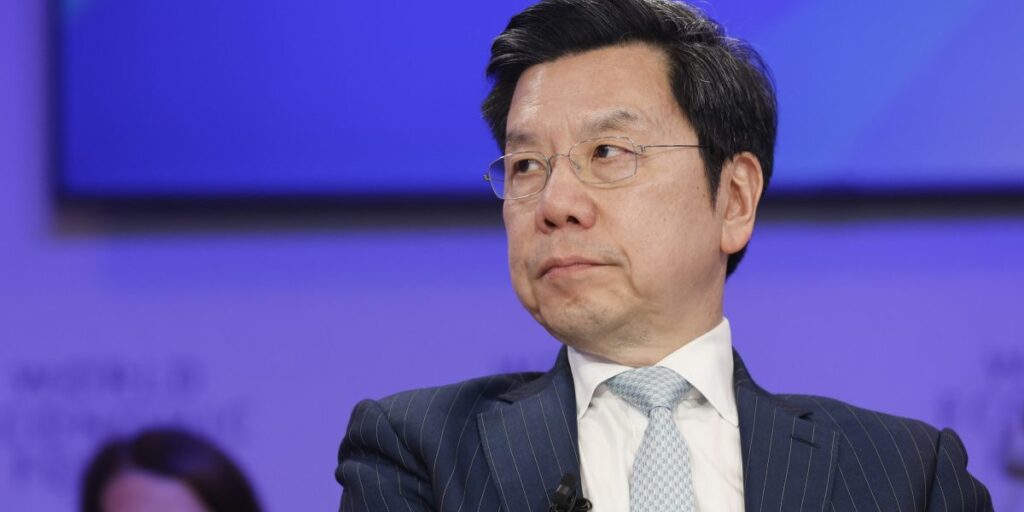
A Beijing startup founded by technology pioneer Kai-Fu Lee is introducing its first consumer artificial intelligence application, a move aimed at helping China benefit from the promising technology.
Li’s firm 01.AI is launching a free productivity assistant called Wanzhi, the latest in a series of artificial intelligence products it is developing. Like Microsoft Corp.’s Office 365 Copilot, it helps users create spreadsheets, documents and slide presentations faster, although it is primarily aimed at the Chinese market. He can interpret financial reports, write meeting minutes, and quickly read books, as well as Elon Musk’s 600,000-word biography to give a quick overview. The application works in Chinese and English.
In an interview with Bloomberg, Li said China needs its own ChatGPT—OpenAI’s chatbot, which was released in 2022 and banned in the country—to speed up interest, adoption and investment.
“For Americans, this moment happened 17 months ago,” Li said on a Zoom call from Beijing. “Chinese users were not having a moment with ChatGPT. Until now, none of the Chinese chatbots or tools have been good enough.”
While American firms such as OpenAI, Meta Platforms Inc. and Alphabet Inc. have become leaders in the field of generative artificial intelligence, and Chinese players are struggling to catch up. Apart from 01.AI, technology players including Baidu Inc. and TikTok parent ByteDance Ltd. are investing in developing their own artificial intelligence models and chatbot services. Beijing also provided financial and political support. Beijing bans foreign AI models in part because of its strict censorship regime, but the so-called “Great Firewall” also ensures that domestic players have a huge local market without global competition.
A 62-year-old native of Taiwan who worked for Apple Inc. and Google, before founding his own venture capital firm more than a decade ago, became CEO of 01.AI last year. The startup reached a valuation of $1 billion, or unicorn statuswithin eight months, thanks to an open-source artificial intelligence model that outperformed Silicon Valley competitors on several key metrics.
In addition to Wanzhi, the company is also introducing a larger, proprietary large language model—the technology behind AI chatbots—called Yi-Large, aimed at enterprise users.
Software developers will be able to use the Yi-Large model at competitive prices. Lee says the model’s application programming interface, or API, will cost $2.50 for 1 million input tokens and $12 for 1 million output tokens—about 1 million tokens allow a developer to send about 250 round-trip requests. According to him, this is much less than OpenAI GPT-4 Turbo.
Like many Chinese companies, 01.AI stockpiled semiconductors for Nvidia Corp.’s “graphics processing units” when it became apparent that the U.S. government planned to ban the export of high-performance chips like the H100, which are used to train leading artificial intelligence services. . Alibaba Group Holding Ltd., a Chinese e-commerce giant that has invested in Li’s firm, provided additional supply of H100s, and 01.AI supplemented its needs with slightly slower and less powerful Nvidia H800 processors.
“Our models were trained on H100 processors legally imported into China,” Li said. “Necessity is the mother of invention, we squeeze everything we can out of the computing resources available.”
Unlike many global artificial intelligence startups, Lee says 01.AI is approaching profitability. After training models on Chinese and universal datasets, Li is distributing models and applications worldwide and attracting domestic and foreign clients to increase revenue in the next year.
After a month and a half of user testing, Li’s company is releasing a version of Wanzhi for PC browsers with more advanced features, as well as a version for mobile devices accessible through the WeChat messaging service. He appears in video tutorials on Douyin, the Chinese version of TikTok, to educate potential users.
“2024 will be an explosive year for generative AI applications in China,” Li said.
Lee said his startup will close the second tranche of its $250 million pre-Series A round in a few weeks and will begin seeking investors for its Series A by the end of the year. The company has also streamlined its hardware and software processes to maximize efficiency and reduce costs.
“When GPT-5 comes out, we’ll be one step behind,” Li said, referring to OpenAI’s rumored next-generation artificial intelligence model. But 01.AI is focused on making AI accessible, not on creating mass-produced, more expensive models. “You can build a giant amazing spaceship, but can it take you from Sacramento to San Francisco?”


